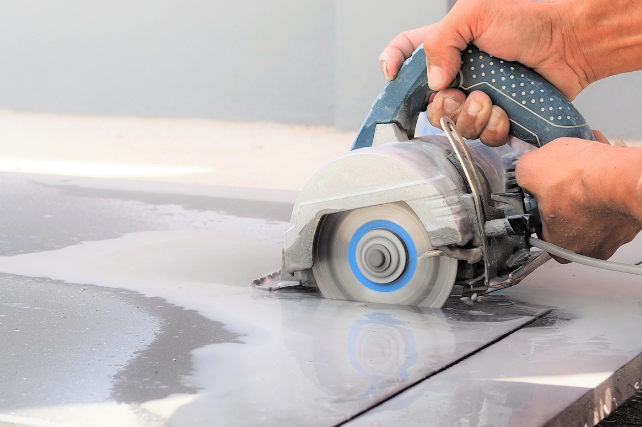Top 4 Safety Tips for Licensed Tilers

Entering the world of freelance tiling offers a golden opportunity to create a booming business grounded on craftsmanship and attention to detail.
But along with honing your tiling skills, understanding the safety nuances associated with the business is crucial.
Safety here is three-pronged: safeguarding your personal well-being, nurturing the financial health of your business, and ensuring client safety.
Here, we delve into the top 4 safety tips that are in every licensed tiler’s best interest to adhere to, as they embark on this fulfilling journey.
1. Personal Safety
Tiling tasks, while seemingly straightforward, come fraught with an array of personal safety hazards that require vigilant attention.
The use of heavy machinery and tools can lead to acute injuries including deep cuts, punctures, or even fractures in the event of a mishap; all a persistent threat without proper training and protective gear.
Moreover, prolonged exposure to the dust generated from cutting tiles without appropriate respiratory protection can lead to respiratory ailments, and handling chemicals like adhesives and grouts without gloves can cause skin irritation and other dermatological issues.
Safety measures such as adequate ventilation, the use of Personal Protective Equipment (PPE) including gloves, masks, and safety glasses, and adopting safe handling practices for tools and chemicals become non-negotiable to guard against these potential hazards.
Here are some tips for helping you to navigate these often tricky safety issues.
1.1 Get Proper Training
Equipment Handling: Ensure you are well-trained to handle various tiling tools and machinery.
First Aid: Equip yourself with basic first aid skills to manage unexpected accidents on-site.
1.2 Use Appropriate Gear
Not wearing the appropriate safety gear during tiling projects can quite literally be a shortcut to disaster, exposing tilers to a series of preventable risks that can have long-lasting implications on their health and well-being.
From slip and fall accidents due to lack of appropriate footwear to suffering irreversible damage to the eyes and respiratory system because of constant exposure to harmful dust and chemicals without protective masks and eyewear; the array of potential calamities is vast, underscoring the indispensable role of proper safety attire in ensuring a tiler’s physical well-being and the overall safety of the tiling project.
Here are some tips for how to protect yourself with the proper gear.
Protective Clothing: Always wear clothing that guards against cuts, slips, and falls.
Eyewear and Gloves: Protect your eyes and hands from chemicals and sharp objects.
2. Financial Safety
Neglecting the financial health of your tiling business, such as mismanaging funds or neglecting to plan for unforeseen expenses, can quickly spiral into insurmountable debt and eventual ruin, extinguishing the prospect of sustainable growth and success.
Here are some tips for taking care of your business (i.e. keeping it safe) from a financial perspective.
2.1 Get Insurance
Liability Insurance: Protect your business from liabilities arising from accidents and damages.
Income Protection Insurance: Shield your income against potential business downtimes.
2.2 Deploy Wise Financial Planning
Emergency Fund: Establish a contingency fund to tide over unexpected financial downturns.
Invoicing: Maintain a meticulous invoicing system to manage your finances prudently.
3. Client Safety
Client safety stands as a cornerstone in the operational ethics of freelance tilers, necessitating a multifaceted approach that addresses various potential hazards.
Firstly, a clear briefing should be offered to clients, delineating the zones of work and establishing protocols to avoid any accidental injuries, such as tripping over tools or materials left carelessly in high-traffic areas.
Moreover, it is imperative to maintain a neat workspace free from hazardous materials and open electrical wires, and to demarcate wet floors clearly to prevent slips and falls, thereby ensuring the client’s safety and fostering a trust-based professional relationship.
Here are some tips to help further facilitate safety for clients while engaging in tiling projects.
3.1 Set Boundaries With Clear Contracts
Well-Defined Contracts: Forge contracts that clearly stipulate the scope of work, protecting both parties’ interests.
Warranty: Offer a warranty period to instill confidence in your clients.
3.2 Deploy Safety Protocols During Operations
Client Briefing: Brief clients on safety measures to follow during the tiling process.
Safe Work Environment: Ensure the workspace is safe to prevent accidents affecting the clients.
4. Business Safety
Keeping your business legally safe is also important!
Here are some tips to make that happen:
4.1 Regulatory Compliance
Certifications and Licenses: Keep all your business certifications and licenses up to date.
Note that if you need some help figuring out how to get licensed as a freelance tiler, check out this guide for more information.
Building Codes: Adhere to local building codes to avoid legal complications.
4.2 Reputation Management
Client Feedback: Encourage satisfied clients to leave positive reviews, enhancing your business reputation.
Professional Development: Invest in continual learning to stay abreast of industry advancements and maintain a competitive edge.
Conclusion
Navigating the freelance tiling landscape necessitates a balance between skill mastery and safety cognizance.
By adopting a holistic safety approach that encompasses personal safety, financial prudence, client safety, and business safeguarding, you not only secure your business but pave the path for a reputable and successful tiling venture.
Let safety be the sturdy foundation upon which your tiling business thrives, securing a future marked by growth, reliability, and impeccable craftsmanship.






